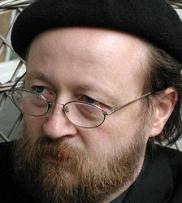Dr. Hermann Detering has died
deutsch english español français
Berlin · 2020 Uwe
Topper ![]()
Obituary on Dr. Hermann Detering
The theologian Hermann Detering, brave skeptic and denier of the historicity of Jesus (in this sense successor to Bruno Bauer and Arthur Drews), pastor in Berlin and painter, succumbed to cancer on October 18, 2018. In the past few years he had lived away from Berlin in the region Altmark, which is why my personal contact with him had broken off and I only now found out about his death.
The grave of honor for Bruno Bauer in Berlin-Neukölln goes back to his initiative.
Detering has operated the website www.radikalkritik.de since 2000. It is still available.
From this website brief facts about his vita:
Born in 1953 in Oldenburg, Protestant theologian, married, four children.
After graduating from high school, studied German philology, classical philology and theology in West Berlin, scientific assistant. Doctorate (1991), topic of the dissertation: Dutch radical criticism, supervisor prof. Walter Schmithals. Finally pastor in Berlin from 1982 to 2009.
I would like to highlight from his publications (all in German):
– Paulusbriefe ohne Paulus. Die Paulusbriefe in der holländischen Radikalkritik, (Pauline letters without Paul. The Pauline Letters in Dutch Radical Criticism) Peter Lang 1992. and: Der Gefälschte Paulus, (Faked St. Paul) Patmos 1995.
Through meticulous textual examination, Detering found that not only the 14 Pauline letters, now recognized as forged, were not written until the following century, but the other seven as well. That means: There are no New Testament writings from the first century. With that, the time scale of the NT collapses, writes Dr. Klaus Jahr (2004 on de.sci.theologie). The encounter of Paul with the apostles: all literature from the 2nd century.
Then there is his book “Falsche Zeugen. Außerchristliche Jesuszeugnisse auf dem Prüfstand" (False Witnesses. Non-Christian testimonies of Jesus on trial), Alibri 2011, to which I wrote an enthusiastic review (go to our library).
As far as his next book is concerned: O du lieber Augustin – Falsche Bekenntnisse
(O dear Augustine - false confessions), Alibri, autumn 2014, I was less interested in the author of the "Confessions", church father Augustine, whom I consider to be a monk from the late 15th century, just a generation before Luther. Thus I deviate considerably from Detering's dating, who saw this Augustine around 1100 AD, in the person of Anselm of Canterbury, around 7 centuries after the official lifetime of St. Augustine.
Before Detering, only the Jesuit Hardouin was so radical, as Detering himself says (in an interview Der 'Klostergeruch' der 'Confessiones' (The 'Monastery Smell' of the 'Confessiones') by Martin Bauer, December 30, 2014.
In any case, it became clear that by the literary critic of the quality of this theologian the entire Christian work is burried, in so far as its historical content is concerned. Subsequently, a stale taste of grotesque and theater remains.
In recent years, the gap between our attitudes has increased. Although Detering introduced such important chronology critics as Edwin Johnson and Polydore Hochart to us and digested Hardouin as well as Kammeier, he did not adopt their fundamental results, but went his own way, half agreeing and half rejecting the evidence of forgery. In terms of methodology, he represented Aschbach's technique: the manuscript may be obscured or skilfully falsified as good as can be possible, yet it is the content that reveals the forgery: "Only internal reasons can reveal the fraud" (Aschbach 1868 in his foreword; see Topper, Die Große Aktion, p. 37).
Bruno Bauer once wrote: "The spirit of the new structure (= Christianity) came from the West, the skeleton was provided by Judaism."
Detering, who quotes this sentence from Bauer, would like to replace the word "west" with "east" to indicate his new conviction that India and Buddhism in particular played a significant role in the emergence of Christianity.
In connection with (the heretic) Basilides Detering says: "I have no doubt whatsoever that Indian 'spirit' was the impetus for the emergence of the early Christian religion and also for the design of the New Testament image of Jesus. In this respect, Christianity for me in the broadest sense is a 'special form' of Indian spirituality illustrated with Jewish pictures and symbols." (see Detering's website)
Fortunately, the website "radical criticism" is still online and will hopefully remain so for many years to come, because the treasures of theological work and literary criticism collected there require use and evaluation for an entire generation.
An English version of Detering's work: Traces of Indian philosophy in the writings of the gnostic Basilides, translated by Dr. Michael Lockwood, is open on his website radikalkritik.de (in 2 parts).
http://radikalkritik.de/wp-content/uploads/2018/09/Basil_part1_b.pdf
http://radikalkritik.de/wp-content/uploads/2018/09/Basil_part2_b.pdf
![]() See review of Deterings book "False witnesses" in our library
See review of Deterings book "False witnesses" in our library
Uwe Topper, Berlin, January 2020
![]() I would like to write a comment to this text:
I would like to write a comment to this text:
